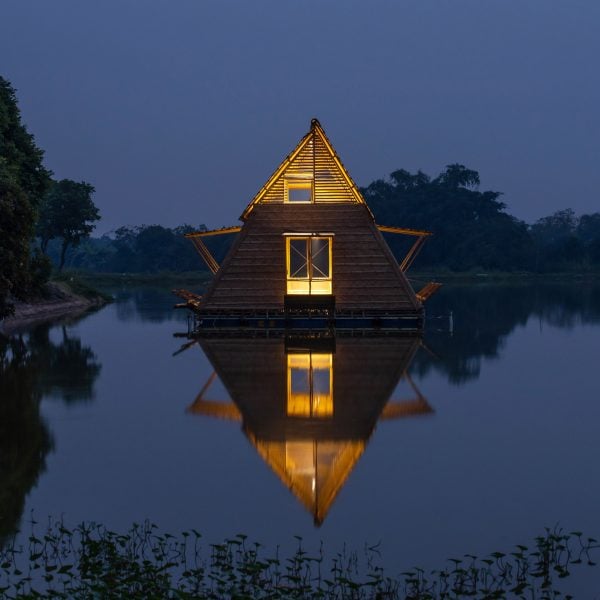[ad_1]
Vietnamese studio H&P Architects has created a prototype for a floating home made of bamboo that is designed to withstand rising sea levels.
Named Floating Bamboo House, it aims to provide locals living in and around the Mekong Delta in Vietnam with a model for climate-resilient housing.
“Vietnam is one of the hardest-hit countries in the world by climate change,” H&P Architects founder Đoàn Thanh Hà told Dezeen.
“Floating Bamboo House is believed to provide a useful alternative for millions of poor households to create a stable and safe accommodation themselves, and adapt to the worst scenario of responding to climate change,” he continued.
Floating Bamboo House is a three-compartment home, with a square ground floor plan that measures six by six metres and a first-floor storey in its roof eaves.
Its exterior form is inspired by the vernacular Rông house, a traditional and rural Vietnamese building typology with a tall, steep thatched roof.
It is made of locally sourced solid-cored bamboo pieces with a diameter of three to five centimetres and three or six metres long.
The segments are joined together simply with latches and ties to create the structural frame of the building.
On its external facades, the prototype is covered with lightweight bamboo screens, woven bamboo sheets, leaves and corrugated iron.
Plastic drums attached to the underside of the house enable it to float. A septic tank, filter tank and water tank are also placed here.
The Floating Bamboo House has been designed for adaptation, with a door system that can open and close flexibly to provide shelter from adverse weather events.
Meanwhile, floor panels of the upper storey can also be removed, enabling the structure to be used as a classroom, library or communal meeting space.
The large roof of the structure allows building users to collect rainwater and harness solar energy to power lighting.
In the future, H&P Architects sees several of the houses coming together to form floating villages.
“Floating Bamboo Houses [could be] connected with each other by floating playing grounds, vegetable-growing rafts [and] fish-raising areas,” the studio explained.
The project was self-initiated by Thanh Hà in 2015 using funding from a charity called Architecture & Social Responsibility (ASR) Foundation. It was then sponsored by Samsung Foundation of Culture in 2022 to participate in an exhibition at the Leeum Museum of Art in Seoul, South Korea.
H&P Architects is a Vietnamese studio founded by Đoàn Thanh Hà in 2009. The studio has completed several homes across Vietnam, including a white corrugated metal house in Hai Duong and a house with a plantable roof allowing its owners to grow their own food.
Other floating architecture designed in response to climate change featured on Dezeen includes Kunlé Adeyemi’s Makoko Floating School in Lagos and a floating island city designed to cope with rising sea levels in the Maldives.
The photography is by Le Minh Hoang.
[ad_2]

